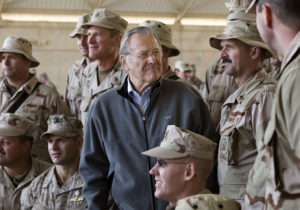How should Christian Realism reflect on the twentieth anniversary of the Iraq War’s start? The answer is exasperatingly complex.
Conventional wisdom unhesitatingly denounces nearly every aspect of the war as a calamity. Every war is a calamity, but Iraq, it is argued, was an avoidable calamity.
Reinhold Niebuhr, chief architect of 20th century Christian Realism, famously opposed the Vietnam War. Almost certainly he would have opposed the Iraq War. In a 1966 New Republic interview he explained:
There is obviously some truth in the argument that if we withdraw from Vietnam, other Asian nations, particularly Thailand, Malaysia and perhaps the Philippines, will not be safe against Chinese expansion. Our military presence is obviously necessary in Asia. But it was certainly an error of inadvertence to become involved in South Vietnam by gradually increasing commitments, so that our prestige is involved in the pretense that we are helping a small nation to preserve its independence. There are indications that this small sliver of a nation with a peasant culture is incapable of either the democracy or integral nationhood which our dogmas attribute to it.
Presumably Niebuhr likewise would call Iraq “incapable of either democracy or integral nationhood,” therefore not meriting U.S. prestige and military force. Note he didn’t oppose the Vietnam War because he had any illusions that South Vietnam would fare better under domination by North Vietnam. He simply found the project of saving and democratizing South Vietnam implausible.
In that same interview in which Niebuhr discussed his opposition to the Vietnam War, the reporter quoted from his most famous book The Irony of American History:
If we should perish, the ruthlessness of the foe would be only the secondary cause of the disaster. The primary cause would be that the strength of a giant nation was directed by eyes too blind to see all the hazards of the struggle; and the blindness would be induced not by some accident of nature or history, but by hatred and vainglory.
In response, Niebuhr clarified that his quote referred to the “irresponsible neutralism to which we were addicted after the First World War and which vaingloriously thought we would be preserved as a museum piece of pure democracy, while other nations were enslaved by Nazism.” He noted “Our power had cured us of irresponsible neutralism, but not of self-righteousness.”
No doubt Niebuhr would have deemed the crusade to liberate and democratize Iraq a bout of national “self-righteousness.” But he would have avoided the naivete suffusing much of the war critique then and now. He would not have disputed that Saddam Hussein murdered and tortured many thousands, fomented war and regional disruption, and was a dangerous enemy of the United States.
Nor would Niebuhr dispute that the U.S. led containment of Saddam Hussein by 2003 was crumbling. The sanctions were increasingly ineffectual and exploited by the dictator for his own enrichment while his people hovered on destitution. The U.S. troop presence in Saudi Arabia and no-fly zones over much of Iraq were not indefinitely sustainable. U.S. vulnerability to terror strikes by even non-state actors, which on 9-11 killed thousands and shut down much of the U.S. economy, left little room for error. The American public, understandably, wanted an aggressive stance against all supporters of international terror.
Niebuhr would have understood these conditions but likely would have counseled more indirect measures than direct invasion and occupation of Iraq. In his New Republic interview, he explained his support for U.S. entry into World War was because “Nazism’s military nationalism threatened the moral substance of Western culture, the Jews with extinction, and non-German continental nations with slavery. None of these issues is involved in a civil war between two portions of a partitioned nation, one Communist and the other non-Communist.” He defended his support of the Korean War by noting it “was undertaken under United Nations auspices.”
Likely Niebuhr would not have been surprised that the U.S. overthrow of Saddam Hussein was achieved relatively easily, but the major problems emerged from the occupation, for which the U.S. did not properly prepare. Unlike Germany and Japan, which the U.S. occupied and transformed more successfully, Iraq was an artificial nation of distinct nationalities, cobbled together by force.
Yet Iraq survives today, arguably strengthened by its fight against ISIS, with an elected government, amid fractious politics and corruption. The current regime, unlike Saddam Hussein’s, does not murder and torture many thousands, or invade neighboring countries. About two thousand U.S. troops remain, although not in direct combat roles.
If Niebuhr were alive today, maybe he would argue that the U.S. should sustain what there is in Iraq, with no illusions about its potentialities. He might warn against exaggerated lessons from Iraq that imagine that U.S. can pursue a detached and “irresponsible neutralism” and stand alone as a “museum piece of pure democracy.” A statecraft dreaming that a great nation can be in the world but not of it is both hubristic and self-righteous, as Niebuhr would surely agree. So too is imagining a nation, great or small, can be immune to human passions, whether fearful or idealistic, in 2003 or 2023.






